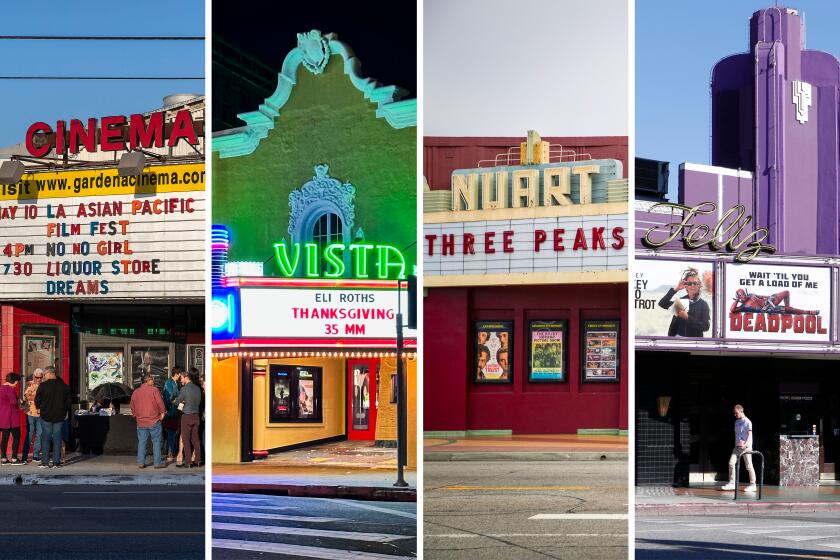 1
1
The hardships faced by people in Gaza over the past two years will be remembered for generations, and film will play a role in sharing those stories. This spring, Iranian filmmaker Sepideh Farsi was preparing to premiere her documentary, “Put Your Soul on Your Hand and Walk,” at the Cannes Film Festival. The film was a moving portrait of Fatma Hassona, a 25-year-old Palestinian photojournalist and poet, based on a year of conversations they had. Tragically, the day after the film was accepted to Cannes, Fatma and her family were killed in an Israeli missile strike.
It’s common for a film to change significantly after it’s finished, but what’s remarkable about “Put Your Soul on Your Hand and Walk” is that, even with its added sadness, it still powerfully conveys the beauty of human hope and our ability to connect with others. Hassona’s compelling presence and the director’s skillful choices make this possible.
The documentary begins with Farsi explaining her desire to understand life in Gaza beyond what was shown in the news. Unable to travel there herself, she connected with Hassona in April 2024 through a friend who was a refugee. Their first conversation, recorded by Farsi while she was in Cairo, immediately challenged the common portrayal of Palestinians as solely victims of the ongoing conflict. Despite witnessing a large explosion the day before, Hassona responded to a question about how she was feeling by saying, “I feel proud.” She spoke with surprising optimism, assuring Farsi that she and her community would continue to live and find joy, describing them as resilient and remarkable. Hassona explained that each day is a conscious effort to maintain hope and not become numb to the difficult circumstances. The documentary’s title comes from Hassona’s description of her daily routine when she leaves home.
You trust her immediately – her bright smile feels like a complete relief. But it’s also clear Farsi carries a deep-seated skepticism, shaped by her experiences as a teenage political prisoner after the Islamic Revolution in her home country, and now living in exile. She describes meeting Hassona as seeing a reflection of herself, recognizing that both their lives have been profoundly impacted by conflict and boundaries.

Movies
The 27 best movie theaters in Los Angeles
We’ve created a guide to 27 fantastic movie theaters in Los Angeles, including iconic spots like the TCL Chinese and New Beverly, popular chains like Alamo Drafthouse, and the best AMC location in Burbank.
Many of Hassona’s photos feature elements of everyday life within a landscape of destruction. Images of children playing, people cycling, workers going about their jobs, and even laundry hanging from damaged buildings suggest a resilient spirit continuing despite the surrounding devastation.
Farsi asks about life in Gaza not as a filmmaker seeking interviews, but with sincere warmth and genuine curiosity, capturing real conversations whenever she can. News reports about the war, politics, and leadership failures do appear on her TV, but they’re quickly changed – she’d much prefer to hear directly from her friend experiencing it all firsthand.
We grew so used to seeing Hassona that we could tell when she was struggling to stay positive, even though her energy and optimism never seemed to fade. During one of their final talks, she suddenly exclaimed, “I just want things to be normal!” – it felt like a line from a musical. Sadly, her story never progressed beyond the beginning.
Farsi’s response was brief – just a few words after their last conversation. Then came a video Hassona filmed of her ruined city, strangely capturing a sense of normal life continuing despite everything. You’ll feel sadness, but what will stay with you is the enduring hope of this remarkable woman.
Read More
- Clash Royale Best Boss Bandit Champion decks
- Vampire’s Fall 2 redeem codes and how to use them (June 2025)
- World Eternal Online promo codes and how to use them (September 2025)
- Best Arena 9 Decks in Clast Royale
- Mobile Legends January 2026 Leaks: Upcoming new skins, heroes, events and more
- Country star who vanished from the spotlight 25 years ago resurfaces with viral Jessie James Decker duet
- How to find the Roaming Oak Tree in Heartopia
- M7 Pass Event Guide: All you need to know
- Solo Leveling Season 3 release date and details: “It may continue or it may not. Personally, I really hope that it does.”
- ATHENA: Blood Twins Hero Tier List
2025-11-15 02:31